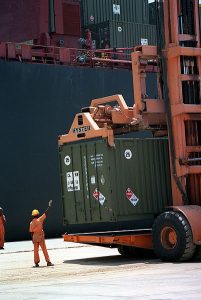PMA & ILWU to Enter Talks on “Concept” of Contract Extension

Dockworker and cargo containers
The Pacific Maritime Association (PMA) and the International Longshore & Warehouse Union (ILWU) are officially going to meet to discuss an early contract extension. Sort of.
In a joint press release, the ILWU and PMA announced they will meet in November to “discuss the concept of a contract extension.”
The concept of a contract extension?
There has been much pressure from manufacturers, farmers and agribusinesses, wholesalers, retailers, importers, exporters, distributors, transportation and logistics providers, and other supply chain stakeholders for the ILWU and PMA to begin contract negotiations long before the July 1st, 2019 expiration of the current contract.
It took over a year for the current contract to be negotiated and ratified.
During that time, negotiations turned contentious with labor slowdowns from the ILWU and mini-lock-outs in response from the PMA. The result was terrible congestion right during the peak and holiday seasons last year. Imported goods didn’t make it to store shelves for holiday shopping, produce rotted on the docks to agricultural exporters chagrin, and international contracts were lost as the United State’s business reputation suffered abroad.
Back in March, the PMA officially requested to begin early contract extension talks with the ILWU.
It is standard practice of the dockworkers unions not to agree to extensions or new contracts before the previous one expires so they can use their biggest weapons of slowdowns, strikes, and threats of strikes to gain leverage in negotiations.
In light of the inability of the PMA and ILWU to negotiate a contract without costly disruptions to the supply chain, shippers are excited by the news of the parties discussing a contract extension well before the current contract expires.
However, words like “concept of a contract extension” should keep shippers’ excitement tempered. Extending a contract early, as discussed above, really would be a new concept for the ILWU. And just because the ILWU and PMA discuss an early extension does not mean an early extension will actually happen.
On the other hand, this is more progress toward an early contract extension than has been seen in the past. Shippers can’t help but hope this is a sign of a new era of smooth contract transitions.
Such an era would require a change in ILWU practice. Hopefully, the ILWU sees that hard timing the ports over labor demands hurts not just everyone else in the industry but the dockworkers themselves. One doesn’t have to look far to see examples:
West Coast ports lost market share as a result of the congestion creating labor strife outlined above. Shippers and carriers choosing other ports for import and export puts jobs at risk. The ILWU hard-timed the Port of Portland so badly (really taking advantage of the time period between contracts) carriers stopped calling on the port with container ships altogether. That equates to dockworker jobs lost directly because of labor strife.
Now there’s a glimmer of hope that there will be less such occurrences in the future.
The press release announcing that glimmer of hope in the form of November talks is quite short. Here it is in its entirety:
PMA & ILWU SCHEDULE EXPLORATORY CONTRACT EXTENSION TALKS
The Pacific Maritime Association (PMA) and the International Longshore and Warehouse Union (ILWU) have agreed to discuss the concept of a contract extension.
The talks have been tentatively scheduled for November 1 and 2. The current Contract Covering 29 west coast ports does not expire until July 1, 2019.
No additional comments from either party will be made prior to the talks. Following the talks, a statement may be issued.
If you’re planning to contact the ILWU or PMA in regard to the talks, don’t expect much. The last two sentences of the press release could be replaced with, “Don’t call us; we’ll call you.”
As per usual, all shippers can do is wait and hope.





Been there, done that, have tee shirts. And a long stretched out negotiations with partial shutdowns resulting from the
early negotiations. I suppose better than not having them, but last time they got us a lot of grief, let’s see if this is different.
And by the way, can you talk about productivity levels while you are talking? Can we start moving toward 40 moves per hour
per crane and get into at least the 1990’s. Absurd that the highest paid long shore people in the world are well below world
class standards and even US East Coast and Gulf productivity levels. You want faster in and out and turn around times, talk to the
ILWU about productivity, please.